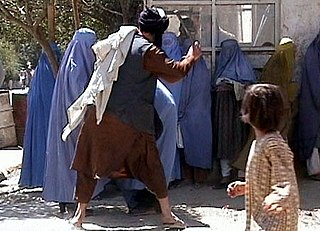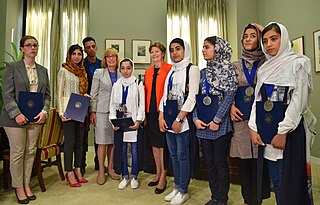Related Research Articles

The Taliban, which refers to itself as the Islamic Emirate of Afghanistan, is a Deobandi-Pashtun Islamic fundamentalist, militant Islamist, and jihadist political movement and military organization in Afghanistan. Currently one of two entities claiming to be the legitimate government of Afghanistan, alongside the internationally recognized Islamic Republic of Afghanistan, the Taliban have de facto control of the country. The Taliban's ideology has been described as combining an "innovative" form of Sharia Islamic law based on Deobandi fundamentalism and militant Islamism, combined with Pashtun social and cultural norms which are known as Pashtunwali, as most Taliban are Pashtun tribesmen. The group is internally funded by its activities in the illegal drug trade by producing and trafficking narcotics such as heroin, extortion, and kidnapping for ransom. They also seized control of mining operations in the mid-2010s that were illegal under the previous government.

Treatment of women by the Taliban has been highly controversial. During its 1996–2001 rule in Afghanistan, the Taliban was considered notorious internationally for its misogyny and violence against women. Its stated motive was to create a "secure environment where the chasteness and dignity of women may once again be sacrosanct", reportedly based on Pashtunwali beliefs about living in purdah. Since the Taliban seized most of Afghanistan in 2021, there are many concerns.

Hamid Karzai is an Afghan politician who served as President of Afghanistan from 22 December 2001 to 29 September 2014. He is also the khan (head) of the Popalzai Durrani Pashtun tribe of Kandahar Province.
The Cabinet of Afghanistan consists of the heads of all the government ministries.

Women's rights in Afghanistan have oscillated back and forth depending on the time period. Women officially gained equality under the 1964 constitution. However, these rights were taken away in the 1990s through different temporary rulers such as the Taliban during the civil war. Especially during Taliban rule, women had very little to no freedom, specifically in terms of civil liberties. Ever since the Taliban regime was removed following the September 11 attacks in the United States, women's rights gradually improved under the Islamic Republic of Afghanistan, and women were once again de jure equal to men under the 2004 constitution, which was largely based on the constitution from 1964. However, women's rights are still complicated by some groups that wish a return to pre-1964 inequality, which continues to cause international concern. When the Taliban took control of most of Afghanistan again in 2021, concern about the future for women in the country increased.

Afghanistan–India relations referred to the diplomatic relations between India and Islamic Republic of Afghanistan, which governed most of Afghanistan between 2001 and 2021. They had been historical neighbours, and share cultural ties through Bollywood and cricket.

Tehrik-i-Taliban Pakistan, alternatively referred to as the Pakistani Taliban, is a Pashtun Islamist armed student group that is an umbrella organization of various student militant groups based along the Afghan–Pakistani border. Most Taliban groups in Pakistan coalesce under the TTP. In December 2007, about 13 groups united under the leadership of Baitullah Mehsud to form the TTP.

The War in Afghanistan was a conflict that took place from 2001 to 2021 in the central Asian country of Afghanistan. It began when the United States and its allies invaded Afghanistan and toppled the Taliban-ruled Islamic Emirate. The war ended with the Taliban regaining power after a 19 years and 10 months-long insurgency against allied NATO and Afghan Armed Forces. It was the longest war in United States history, surpassing the Vietnam War (1955–1975) by approximately five months.
The Quetta Shura or Council of Leaders was a body of Afghan Taliban leaders that was formed in May 2002 and was based in the city of Quetta, in the Balochistan province of Pakistan. The shura was formed after the Islamic Emirate of Afghanistan was toppled in late 2001, the senior leadership escaping to Pakistan.

Abdul Ghani Baradar is an Afghan political and religious leader who is currently the acting first deputy prime minister alongside Abdul Salam Hanafi and Abdul Kabir, of the Islamic Emirate of Afghanistan. He is also a co-founder of the Taliban. He is known by the honorific Mullah.

Malala Yousafzai, often referred to mononymously as Malala, is a Pakistani activist for female education and a Nobel Peace Prize laureate. She is also the world's youngest Nobel Prize laureate, and second Pakistani. She is known for human rights advocacy, especially the education of women and children in her native Swat Valley in Khyber Pakhtunkhwa, northwest Pakistan, where the Tehrik-i-Taliban Pakistan had at times banned girls from attending school. Her advocacy has grown into an international movement, and according to former Pakistani Prime Minister Shahid Khaqan Abbasi, she has become the country's "most prominent citizen".
Shabana Basij-Rasikh is an Afghan educator, humanitarian, and women's rights champion. She is the founder of Hela, inc. and School of Leadership, Afghanistan, and has received worldwide recognition for her work.

Hibatullah Akhundzada is an Afghan political and religious leader who currently serves as the head of the Islamic Emirate of Afghanistan, as the supreme leader of the Taliban. The Taliban call him the Amir al-Mu'minin, which was the title of his two predecessors. He is also known by the honorifics Mawlawi and Mullah.
Mohammad Yaqoob is the eldest son of Mohammed Omar, who was the Afghan mujahideen commander, founder of the Taliban and Emir of the Islamic Emirate of Afghanistan. He is one of two deputies to the current supreme leader, Hibatullah Akhundzada.
Somaya Faruqi is an Afghan student and engineer, and the captain of the Afghan Girls Robotics Team, also known as the "Afghan Dreamers." She was named to the BBC's 100 Women in 2020 and was featured by UNICEF in 2020 as well as the UN Women Generation Equality campaign in 2021. During the COVID-19 pandemic in 2020, her team designed a prototype ventilator to help fight the coronavirus in Afghanistan.

Taliban forces took control of Afghanistan's capital city of Kabul on 15 August 2021 during a military offensive against the Afghan government that had begun in May 2021. The capture took place hours after President Ashraf Ghani fled the country. Most of the provincial capitals of Afghanistan had fallen in succession in the midst of a US troop withdrawal under a February 2020 US–Taliban agreement that concluded on 30 August 2021.

The leader of the Islamic Emirate of Afghanistan is the supreme leader of the Taliban, formally known as the Islamic Emirate of Afghanistan, and the de facto leader of Afghanistan. During the Taliban’s first regime from 1996 to 2001, the title was officially the head of the Supreme Council of the Islamic Emirate of Afghanistan, which was only held by Mohammed Omar.

The Panjshir conflict is an ongoing armed conflict between the formerly dominant Islamic Republic of Afghanistan, including the National Resistance Front and allied groups, and on the other side the newly dominant Islamic Emirate of Afghanistan which is controlled by the Taliban. On 17 August 2021, Amrullah Saleh assumed the Afghan presidency and declared the resistance. On 26 August, a brief ceasefire was declared. On 1 September, talks broke down and fighting resumed as the Taliban attacked resistance positions.

The Afghan Girls Robotics Team, also known as the Afghan Dreamers, is an all-girl robotics team from Herat, Afghanistan, founded in 2017 by Roya Mahboob and made up of girls between ages 12 and 18 and their mentors.
The politics of Afghanistan takes place within the framework of Taliban rule. Following their takeover of Afghanistan, the Taliban announced a caretaker government on 7 September 2021.
References
- ↑ Coughlan, Sean (23 March 2014). "From secret school to Afghanistan's future". BBC News. Retrieved 22 August 2021.
- ↑ Daugherty, Susan (December 10, 2014). "A Native Daughter Returns to Afghanistan on Daring Mission: Educating Girls". National Geographic. Retrieved 24 August 2021.
- ↑ Smith, Casey (June 19, 2017). "Inside the Afghan School Where Girls Can Dress Like Girls". National Geographic. Retrieved 24 August 2021.
- ↑ Sohini Goswam (22 August 2021). "Co-founder of all-girls Afghan school burns her students' records amid dread". Hindustan Times. Retrieved 22 August 2021.
- ↑ Dorothy Wickenden (19 July 2021). "Afghanistan's Only All-Girls Boarding School Fears the Return of the Taliban". The New Yorker. Retrieved 22 August 2021.
- ↑ "Founder of all-girls school in Afghanistan burns records to shield students from Taliban". India Today. 22 August 2021. Retrieved 22 August 2021.
- ↑ Princewill, Nimi; Feleke, Bethlehem; Busari, Stephanie (August 25, 2021). "All students, staff at Afghanistan's only girls' boarding school flee to Rwanda". CNN. Retrieved 2 September 2021.
- ↑ "August 24: An update from Shabana". SOLA. Retrieved 25 August 2021.
- ↑ McVeigh, Karen (25 August 2021). "'Don't avert your eyes': Afghan teachers urge world to defend girls' education". The Guardian. Retrieved 25 August 2021.